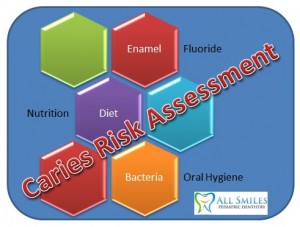May 4th, 2017
 What is the Caries Risk Assessment Tool?
What is the Caries Risk Assessment Tool?
The Caries Risk Assessment Tool is a research-based tool used to identify the risk factors that cause dental decay. It is also used to provide recommendations to reduce the risk of future cavities. It has been well documented that dental decay affects children throughout their childhood and into their early adulthood. The National Health and Nutrition Examination Survey showed that there has been a significant increase in dental decay in primary (baby) teeth. This study further revealed that in U.S. children ages 2-5, one in four had dental decay. Moreover, one half of children ages 12-15 had dental decay.
Why is this needed?
Instead of just filling cavities, this new method helps identify the cavity-forming risk factors and then provides guidelines to prevent future dental cavities. The old method of just treating dental decay did not address the root factors that cause dental decay. Several years ago, leading dental experts, ranging from educators, clinicians, and policy makers, converged to create the Caries Risk Assessment tool. Using the Caries Risk Assessment is a new paradigm shift that helps health care providers and educators provide specific recommendations to decrease the risk of getting dental caries.
What are the categories?
There are 3 risk categories: High, Moderate, and Low
For each category there are recommendations based on the child’s age.
Some common recommendations include: nutrition changes, use of fluoride supplements, sealants, and more frequent cleaning and checkups.
Still need more information?
For additional information you may contact these organizations:
I've got it, what should I expect at my child's next dental visit?
At your child's next dental checkup visit, you will be asked a few questions that will help determine your child's risk for dental decay. These responses will be used along with the information Dr. Allen Job gather's during your child's examination to determine your child's risk for dental decay. Dr. Job and his team will be review that information with you at the end of the appointment.
How often will the Caries Risk Assessment be performed?
The Caries Risk Assessment will be performed each time at you're child's checkup appointment. This is an ongoing process. Our goal at All Smiles Pediatric Dentistry is to prevent dental decay from starting in your child. This involves providing you with easy ways to prevent dental decay. Our secondary goal is to convert Moderate and High Risk patients into Low Risk patients.
Contact our office, All Smiles Pediatric Dentistry to schedule an appointment with Dr. Allen Job. Dr. Job and his team will be able to provide you with more information for your child at his or her visit.

Dr. Allen Job, DDS, MS, MPH, MS is a board certified pediatric dentist who practices in San Diego, California, where he specializes in prevention. He is also an assistant professor at Loma Linda University Department of Pediatric Dentistry.
Tags: All Smiles Pediatric Dentistry, bacteria, best dentist in san diego, Caries Risk Assessment, cavities, decay, dentist, dentist near me, dentist san diego, diet, Dr. Allen Job, enamel, fluoride, kids dentist, kids dentist near me, nutrition, oral hygiene, pediatric dentist, pediatric dentist near me, pediatric dentist san diego, risk factors, San Diego CA, san diego dentist, sealants
Posted in Uncategorized | No Comments
April 27th, 2017
[caption id="attachment_217" align="alignleft" width="500"] Baby and mother[/caption]
Baby and mother[/caption]
With the arrival of your adorable baby, there are lots of new tasks that are new for you as a parent. Feeding or nursing time with your baby is important. Here are some recommendations of taking care of their oral health.
1. Use a Washcloth
Yes, using a clean wet washcloth after feeding times will keep your baby's gums healthy. Make this a habit for you to do with your baby. Doing this will also stimulate your baby's gums, which will help promote good bloodflow. Here's an additional benefit, massaging the gums with a clean wet washcloth may aid when your baby starts teething!
2. Avoid Juices in the Bottle
Juices generally do not provide much nutritional value for your baby. These drinks are filled with sugar and have empty calories. Milk and water are good fluids for your baby to consume. Want more information about diet? Here are some additional recommendations from the National Maternal & Child Oral Health Resource Center.
3. First Dental Visit by First Birthday
Schedule your baby's first visit by their first birthday. Why? As your baby's new teeth start coming in, your baby's diet and eating habits will change. Seeing a pediatric dentist by the first birthday will help you get more ways of keeping those teeth cavity free and pain free.
Dr. Allen Job and his team at All Smiles Pediatric Dentistry look forward to meeting you and your baby.
Check out more information, about how to take care of your baby's teeth.
*This blog is part of the Baby Steps Series. Look for future blogs in this series.

Dr. Allen Job, DDS, MS, MPH, MS is a board certified pediatric dentist who practices in San Diego, California, where he specializes in prevention. He is also an assistant professor at Loma Linda University Department of Pediatric Dentistry.
Tags: baby dental care, baby steps, best dentist in san diego, cavities, dental decay, dentist, dentist near me, dentist san diego, Dr. Allen Job, first dental visit, kids dentist, kids dentist near me, oral health care for infants, parenting, pediatric dentist, pediatric dentist near me, pediatric dentist san diego, san diego dentist
Posted in Uncategorized | No Comments
April 24th, 2017
 If your child is actively participating in sports in sunny San Diego, whether it is softball, basketball, football, then he or she is at greater risk for dental injuries. A dental sports injury can occur in the form of a chipped or cracked tooth, broken jaw, cuts to the inside of the mouth, lips, and/or tongue.
If your child is actively participating in sports in sunny San Diego, whether it is softball, basketball, football, then he or she is at greater risk for dental injuries. A dental sports injury can occur in the form of a chipped or cracked tooth, broken jaw, cuts to the inside of the mouth, lips, and/or tongue.
Here are some dental facts:
- Did you know that 3 out of 4 children will have experienced some type of injury to their teeth by the age of 15?
- Girls are more likely to have a dental injury due to sports.
- The cost of treating sports-related dental injuries can cost thousands of dollars! (Factor in the time and cost of treatment, numerous follow up visits, and time lost from work and school.)
Custom Mouthguard
A custom athletic mouthguard is an easy way to protect your child’s teeth during sports. It will cushion the impact from a fall or an errand blow to the mouth. Every year there are 200,000 dental injuries that are prevented by using a mouthguard. Using a well fitting mouthguard can lessen the impact from concussions and jaw fractures. Moreover, a well fitting mouthguard can reduce soft tissue injuries to the cheeks, tongue, and lips.
Dr. Allen Job says, “custom athletic mouthguards are made to fit your child’s mouth comfortably.” They optimally protect the teeth, gums and jaw. They flex, yet won’t tear. They won’t limit speech or breathing. More importantly, more since they fit perfectly they are more likely to be used regularly than an ill-fitting one.”
Ready-made mouthguards may be cheaper, but don’t fit as well thereby making it harder to speak or breathe. Consequently, they are worn less. Also, they also do not provide the same comfort and protection as a custom athletic mouthguard.
Check out more recommendations regarding on what to do in case of dental injury.
Contact All Smiles Pediatric Dentistry and find out how we can incorporate your child’s team colors into his or her custom athletic mouthguard.
Save your smile with a mouthguard!

Dr. Allen Job, DDS, MS, MPH, MS is a board certified pediatric dentist who practices in San Diego, California, where he specializes in prevention. He is also an assistant professor at Loma Linda University Department of Pediatric Dentistry.
Tags: All Smiles Pediatric Dentistry, April, athletic mouthguard, best dentist in san diego, cheeks, concussion, dental injury, dentist, dentist near me, dentist san diego, Dr. Allen Job, jaw fractures, kids dentist, kids dentist near me, lips, mouthguard, National Facial Protection Month, pediatric dentist, pediatric dentist near me, pediatric dentist san diego, San Diego CA, san diego dentist, sports injury, tongue, trauma
Posted in Uncategorized | No Comments
April 17th, 2017
1. What are they?
A dental sealant is a protective coating that is placed over the grooves of a tooth to prevent dental cavities. Sealants help protect the chewing surface of teeth. Sealants are generally placed on molars, but sometimes can be placed on hard to reach crevices on other teeth.
2. How are the done?
Once the tooth is cleaned and dried, the sealant material is placed onto the grooves of the tooth. A curing light is then used to harden the liquid sealant into a hard, waterproof, cavity fighting shield.
3. Do I need to get my teeth numbed for sealants to be placed?
No. The process of placing a sealant is quick and painless. No local anesthesia is needed.
4. How do I maintain them?
Brush and floss just like you would any other teeth. Also to prevent sealants from chipping avoid ice or hard candy.
5. How do I find out more about sealants?
Check out our website for more info about sealants. Then, contact All Smiles Pediatric Dentistry and inquire about sealants for your child.
 Dr. Allen Job, DDS, MS, MPH, MS is a board certified pediatric dentist who practices in San Diego, California, where he specializes in prevention. He is also an assistant professor at Loma Linda University Department of Pediatric Dentistry.
Dr. Allen Job, DDS, MS, MPH, MS is a board certified pediatric dentist who practices in San Diego, California, where he specializes in prevention. He is also an assistant professor at Loma Linda University Department of Pediatric Dentistry.
Tags: All Smiles Pediatric Dentistry, best dentist in san diego, cavities, decay, dental sealants, dentist, dentist near me, dentist san diego, hard candy, ice, kids dentist, kids dentist near me, pediatric dentist, pediatric dentist near me, pediatric dentist san diego, san diego dentist, sealants, tooth
Posted in Uncategorized | No Comments
 What is the Caries Risk Assessment Tool?
What is the Caries Risk Assessment Tool?





